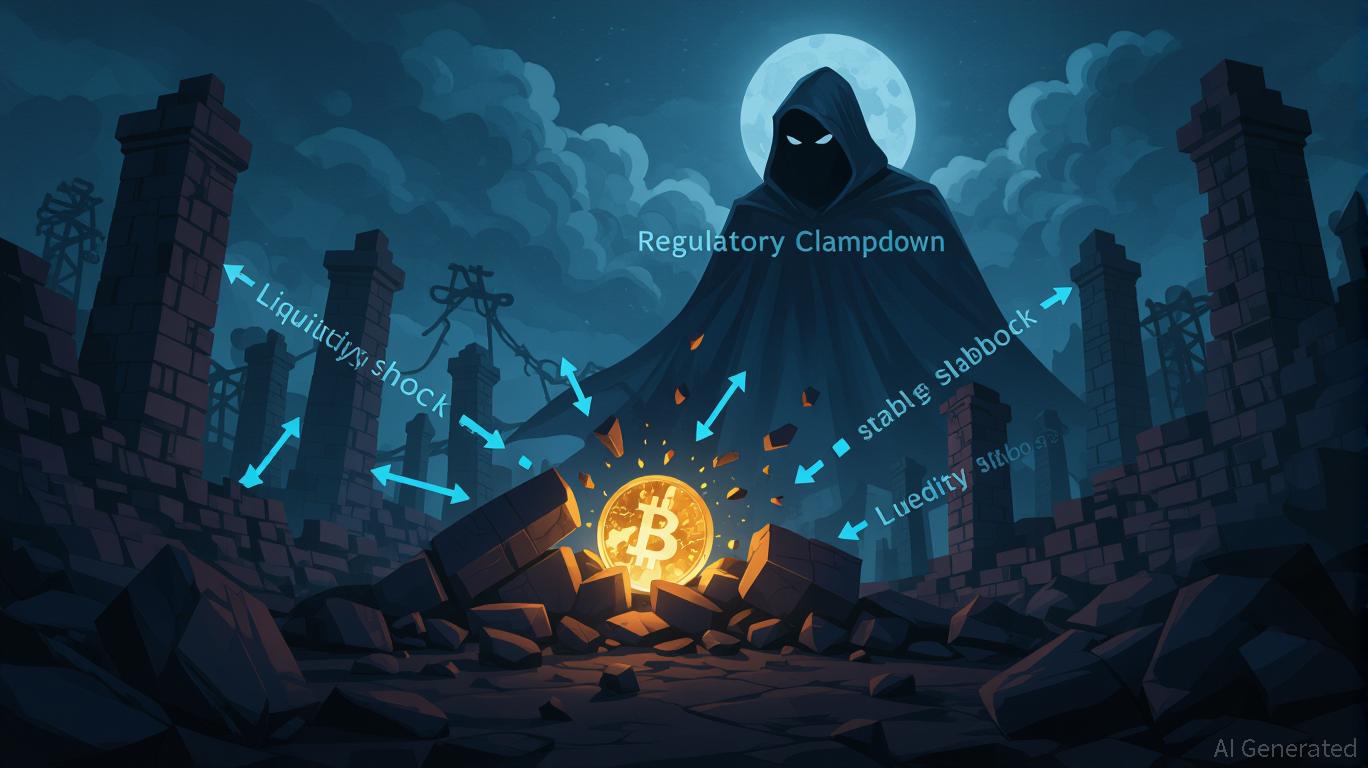PENGU USDT Sell Alert and Its Wider Impact on Stablecoin Market Liquidity
- PENGU USDT's Q3 2025 sell-offs exposed systemic risks in DeFi stablecoin infrastructure, including flawed collateral oversight and smart contract vulnerabilities. - Regulatory tightening under U.S. GENIUS Act and EU MiCA is reshaping market structure, with compliant stablecoins like USDC outpacing USDT in institutional adoption. - Experts advocate overcollateralization and real-time monitoring to mitigate liquidity shocks, though implementation challenges persist for smaller protocols. - Market consolida
A Shaky Base: Systemic Threats in DeFi
The Q3 2025 downturns involving PENGU
Though PENGU USDT was not directly involved in these failures, it faces similar exposures. Its liquidity relies on a collateral system that, as of Q4 2025, remains largely non-transparent. Experts caution that depending too heavily on high-yield incentives—like those from platforms such as Katana—can create an illusion of safety. While these rewards may draw in temporary liquidity, they also

Stricter Regulations and the Push for Compliance
The regulatory environment has added further complexity. The U.S. GENIUS Act and the EU’s MiCA rules have brought in tougher compliance standards, raising operational expenses for speculative assets like PENGU USDT.
This divergence highlights a key reality: by 2025, liquidity is determined not just by yield, but by trust. Investors are increasingly valuing openness and regulatory compliance, compelling stablecoin providers to adapt or risk becoming obsolete.
Addressing Risks: Overcollateralization and Continuous Oversight
To overcome these obstacles, specialists recommend overcollateralized models supported by tangible assets. Although these systems may offer lower yields, they provide a safeguard against liquidity crises. For instance,
Still, this approach is not without its challenges. Diversification requires access to premium assets, which many DeFi projects lack. Additionally, implementing real-time monitoring calls for advanced infrastructure, which can be prohibitively expensive for smaller entities.
Market Dynamics: Moving Toward a New Balance?
The sell signals for PENGU USDT and the wider DeFi instability are driving changes in market structure. Investors are reassessing their risk tolerance, favoring stablecoins with strong collateral backing and regulatory transparency. This trend is speeding up the consolidation of the stablecoin sector, with smaller projects needing to innovate or exit the market.
PENGU USDT’s recovery will depend on its ability to resolve liquidity challenges and comply with new regulatory standards.
Conclusion: Stability as the Key to Competitiveness
The PENGU USDT sell-off reflects the broader hurdles confronting stablecoins. As the market evolves, liquidity will hinge less on speculation and more on robust risk controls. Overcollateralization, continuous monitoring, and regulatory compliance are now essential, not optional. For investors, the message is unmistakable: in an environment of interconnected protocols and tightening oversight, stability is the most valuable asset.
Disclaimer: The content of this article solely reflects the author's opinion and does not represent the platform in any capacity. This article is not intended to serve as a reference for making investment decisions.
You may also like
From Spectator to Participant: How Prediction Markets Are Transforming the Way Fans Interact with Sports
- NBA star Tristan Thompson predicts prediction markets will boost sports viewership by integrating real-time betting into broadcasts. - FanDuel launches a standalone app with CME Group , offering sports and economic prediction contracts while addressing regulatory and consumer protection concerns. - Polymarket partners with UFC and NHL to introduce live prediction scoreboards, transforming passive viewing into interactive trading during events. - Growing industry adoption by Google, Yahoo Finance, and pla

Federal Judge Blocks Trump’s Attempt to Pressure UC Through Funding
- A federal judge blocked Trump's plan to defund UC over antisemitism claims, citing First and Tenth Amendment violations. - The $1.2B funding demand and civil rights investigations were deemed coercive tactics to suppress "woke" academic views. - UC warned the financial threat would devastate its research programs, while critics called the strategy authoritarian. - The ruling preserves UC's funding but leaves unresolved tensions over government influence in higher education.

Ethereum News Today: Ethereum’s Unyielding Approach: Shutting the Door on Centralization
- Ethereum co-founders release "Trustless Manifesto" on blockchain to reinforce decentralization amid ecosystem centralization risks. - Document encoded in ownerless smart contract emphasizes self-custody, public verifiability, and rejecting convenience-driven centralization. - Warns against AWS outages and hosted RPCs creating single points of failure, citing 25% throughput loss on Coinbase's Base chain. - Critiques Paradigm's growing influence and institutional staking risks, proposing DVT to mitigate ce

Disney and YouTube TV finalize agreement to restore service after blackout